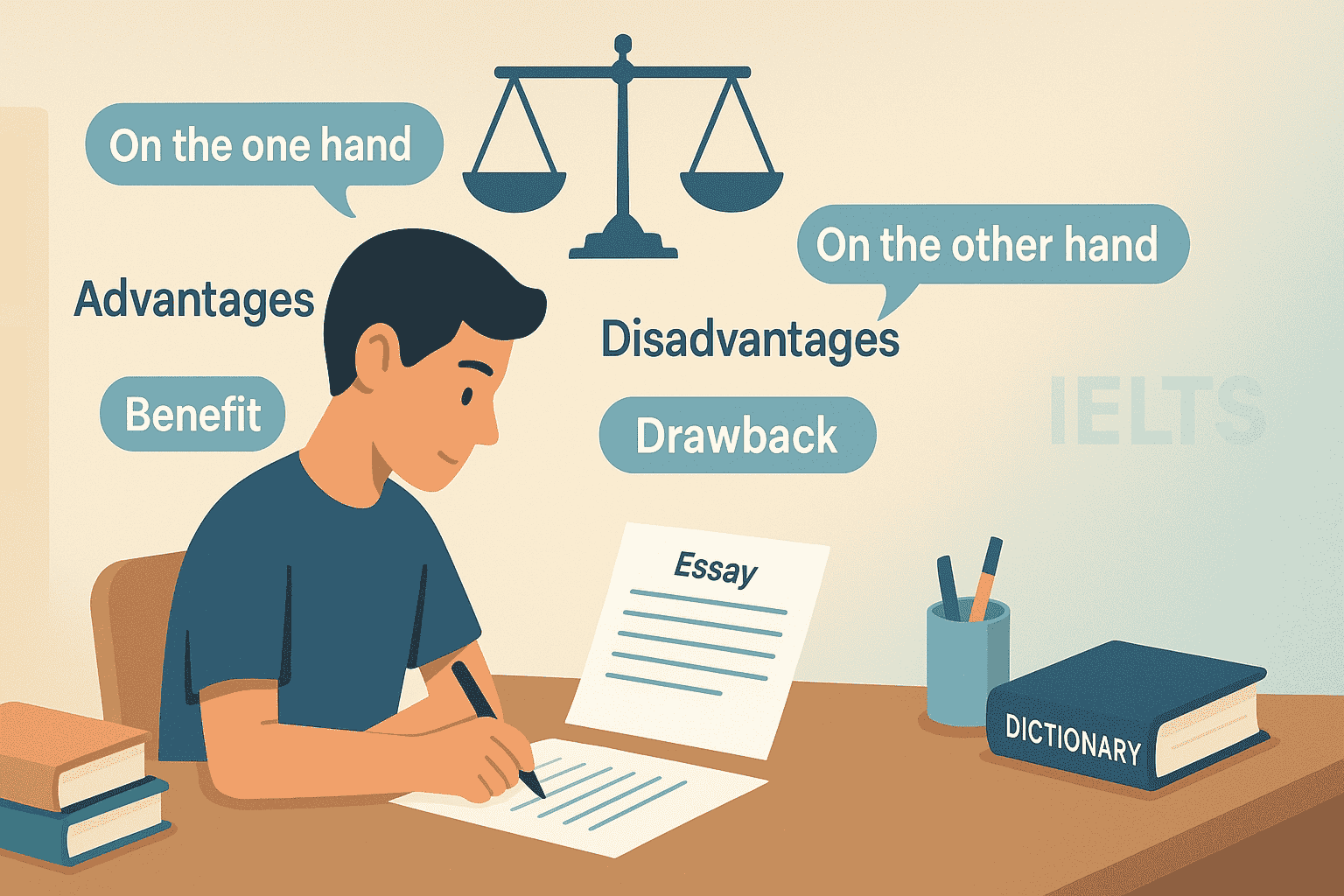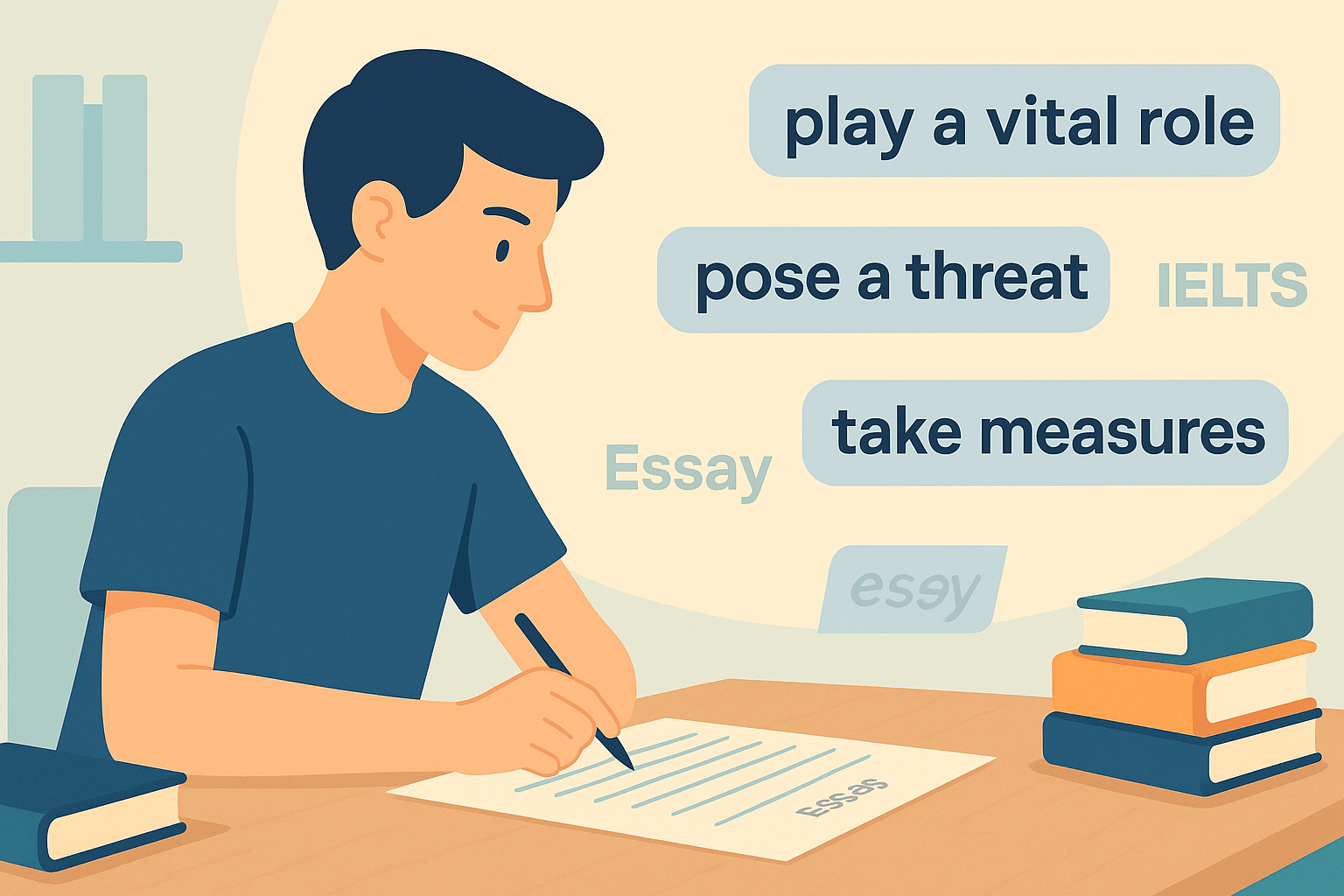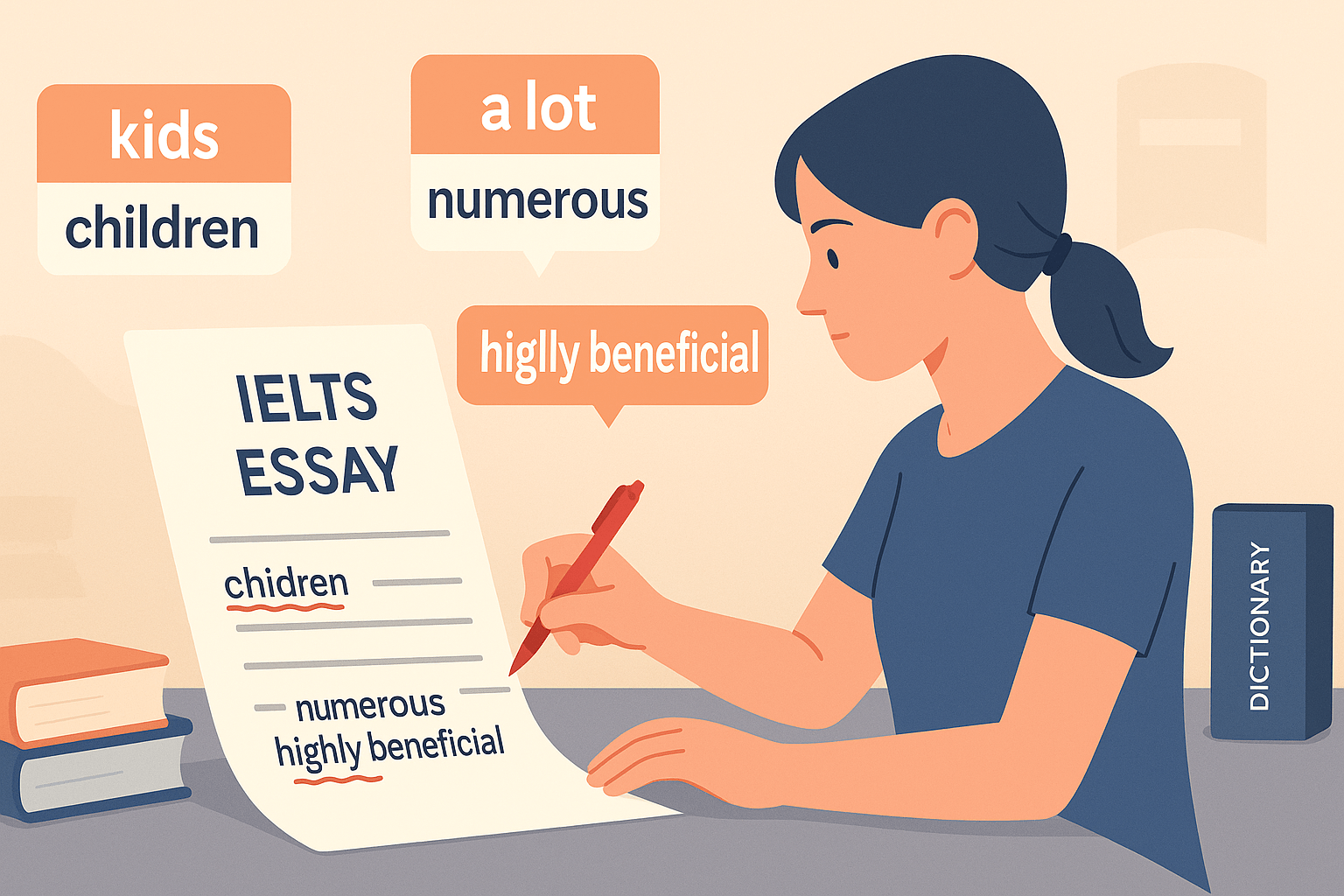When I teach my IELTS students how to approach advantages and disadvantages essays, one question always comes up:
“How do I write about pros and cons in a formal, academic way?”
The answer is to use IELTS advantages and disadvantages essay vocabulary—formal phrases, connectors, and pros and cons expressions that help you:
- ✅ Discuss both sides clearly
- ✅ Compare positive and negative outcomes
- ✅ Achieve Band 7–9 scores for Lexical Resource and Coherence
In this guide, I’ll share my teacher-approved vocabulary, examples, and practical tips to make your Task 2 essays examiner-friendly.
Before we begin, check my IELTS Writing Task 2 Vocabulary for Band 7–9—it’s the pillar resource for all Task 2 writing vocabulary.
Why IELTS Advantages and Disadvantages Essay Vocabulary Matters
Advantages and disadvantages essays are common in IELTS Writing Task 2.
Examiners expect you to:
- Present both benefits and drawbacks clearly
- Use formal language and academic expressions
- Maintain logical flow with cohesive devices
Without the right vocabulary:
- Your essay may sound informal
- You risk repeating words like “good” and “bad”
- Your Coherence and Lexical Resource scores could drop
AEO Answer Snippet:
IELTS advantages and disadvantages essay vocabulary includes formal words and phrases to present pros, cons, and balanced outcomes in Task 2 writing.
For more official guidance:
Essential IELTS Advantages and Disadvantages Essay Vocabulary
Here’s my categorized vocabulary list for presenting pros and cons in a formal essay.
1. Phrases to Introduce Advantages and Disadvantages
Use these in your introduction or topic sentences:
- There are several advantages and disadvantages to…
- This trend brings both benefits and drawbacks.
- While there are clear benefits, there are also notable downsides.
- Like any development, it has both positive and negative effects.
Example:
“Online education has both clear advantages and notable disadvantages for students.”
2. IELTS Advantages and Disadvantages Essay Vocabulary for Pros
Use formal academic words for advantages:
- benefit
- positive impact
- advantage
- opportunity
- merit
- gain
Phrases for Pros:
- One major advantage is that…
- A key benefit of this approach is…
- This offers an opportunity to…
Example:
“One significant benefit of renewable energy is its positive impact on the environment.”
3. IELTS Advantages and Disadvantages Essay Vocabulary for Cons
Use formal academic words for disadvantages:
- drawback
- negative impact
- limitation
- challenge
- risk
- shortcoming
Phrases for Cons:
- One main drawback is that…
- A notable disadvantage is…
- This may pose a challenge because…
Example:
“One drawback of online education is the lack of face-to-face interaction with teachers.”
4. Phrases for Comparing Outcomes
When weighing pros and cons, use contrast and evaluation expressions:
- On the one hand… / On the other hand…
- Although there are advantages, there are also disadvantages.
- While this trend offers benefits, it also brings risks.
- The benefits must be weighed against the drawbacks.
Example:
“On the one hand, technology saves time; on the other hand, it can increase distractions.”
5. Phrases for Conclusion and Evaluation
Conclude your essay by summarizing the overall balance:
- In conclusion, while there are clear advantages, the disadvantages should not be ignored.
- Overall, the benefits outweigh the drawbacks.
- Taking both perspectives into account, this development is largely positive.
Example:
“In conclusion, although online learning has some limitations, its advantages make it a valuable alternative to traditional education.”
Teacher Tips for Using Pros and Cons Vocabulary
As an IELTS trainer, I always give my students these tips for higher scores:
1. Avoid Repeating “Good” and “Bad”
Instead of saying:
❌ “Fast food is good but also bad.”
Upgrade to:
✅ “Fast food is convenient and affordable, but it can have detrimental effects on health.”
2. Combine Pros and Cons Vocabulary with Linking Words
Cohesion matters. Use connectors like:
- Additionally, Moreover, However, In contrast, While
Example:
“Renewable energy is beneficial for reducing pollution. However, its initial cost is a major drawback.”
3. Maintain a Balanced and Formal Tone
- Present both sides objectively before your evaluation
- Avoid casual words like “stuff”, “things”, or “a lot”
- Use formal synonyms like “aspects, factors, elements”
Sample Paragraph Using IELTS Advantages and Disadvantages Essay Vocabulary
“Studying abroad has several advantages. One major benefit is exposure to different cultures, which broadens students’ perspectives. However, it also has drawbacks, such as homesickness and high living costs. Overall, while the experience can be challenging, the benefits often outweigh the disadvantages.”
Notice how this paragraph:
- Introduces both pros and cons clearly
- Uses formal pros and cons vocabulary
- Maintains logical flow with connectors
Quick Practice Exercise
Rewrite this informal sentence in formal IELTS style:
“Social media is good because it’s easy to use, but it’s also bad because it wastes time.”
Suggested Answer:
“Social media offers the advantage of convenience, whereas its drawback is the potential for time-wasting and distraction.”
FAQ Section
Q1: How do I write advantages and disadvantages in IELTS essays?
Use formal pros and cons vocabulary like benefit, drawback, advantage, limitation and neutral connectors to compare outcomes.
Q2: Can I give my opinion in an advantages and disadvantages essay?
Yes, most tasks allow a brief evaluation. Use phrases like “Overall, the benefits outweigh the drawbacks.”
Q3: How many advantages and disadvantages should I include?
Usually two of each are enough for a Band 7–9 essay, as long as they are explained well with examples.
Conclusion
Mastering IELTS advantages and disadvantages essay vocabulary is essential for writing clear, balanced Task 2 essays.
When you:
- Present both sides with formal pros and cons vocabulary
- Use contrast and evaluation phrases
- Maintain cohesion and clarity
… you are writing like a Band 7–9 IELTS candidate.
🔗 Next step: Strengthen your vocabulary with our IELTS Writing Task 2 Vocabulary for Band 7–9 to boost your writing score.





